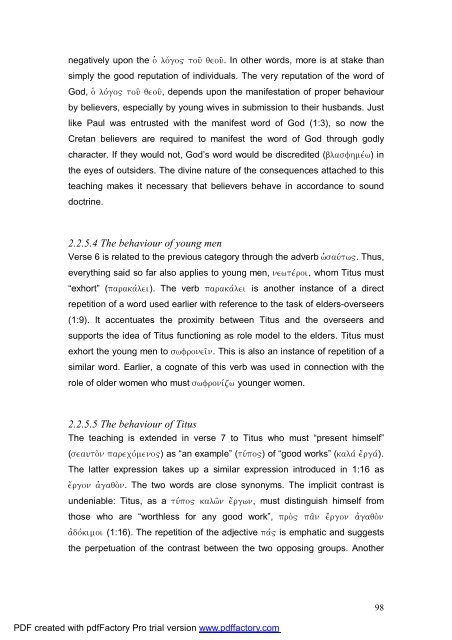A Text centred rhetorical analysis of Paul's Letter to Titus
A Text centred rhetorical analysis of Paul's Letter to Titus
A Text centred rhetorical analysis of Paul's Letter to Titus
You also want an ePaper? Increase the reach of your titles
YUMPU automatically turns print PDFs into web optimized ePapers that Google loves.
negatively upon the oJ lovgo" <strong>to</strong>u` qeou`. In other words, more is at stake than<br />
simply the good reputation <strong>of</strong> individuals. The very reputation <strong>of</strong> the word <strong>of</strong><br />
God, oJ lovgo" <strong>to</strong>u` qeou`, depends upon the manifestation <strong>of</strong> proper behaviour<br />
by believers, especially by young wives in submission <strong>to</strong> their husbands. Just<br />
like Paul was entrusted with the manifest word <strong>of</strong> God (1:3), so now the<br />
Cretan believers are required <strong>to</strong> manifest the word <strong>of</strong> God through godly<br />
character. If they would not, God’s word would be discredited (blasfhmevw) in<br />
the eyes <strong>of</strong> outsiders. The divine nature <strong>of</strong> the consequences attached <strong>to</strong> this<br />
teaching makes it necessary that believers behave in accordance <strong>to</strong> sound<br />
doctrine.<br />
2.2.5.4 The behaviour <strong>of</strong> young men<br />
Verse 6 is related <strong>to</strong> the previous category through the adverb wJsauvtw". Thus,<br />
everything said so far also applies <strong>to</strong> young men, newtevroi, whom <strong>Titus</strong> must<br />
“exhort” (parakavlei). The verb parakavlei is another instance <strong>of</strong> a direct<br />
repetition <strong>of</strong> a word used earlier with reference <strong>to</strong> the task <strong>of</strong> elders-overseers<br />
(1:9). It accentuates the proximity between <strong>Titus</strong> and the overseers and<br />
supports the idea <strong>of</strong> <strong>Titus</strong> functioning as role model <strong>to</strong> the elders. <strong>Titus</strong> must<br />
exhort the young men <strong>to</strong> swfronei`n. This is also an instance <strong>of</strong> repetition <strong>of</strong> a<br />
similar word. Earlier, a cognate <strong>of</strong> this verb was used in connection with the<br />
role <strong>of</strong> older women who must swfronivzw younger women.<br />
2.2.5.5 The behaviour <strong>of</strong> <strong>Titus</strong><br />
The teaching is extended in verse 7 <strong>to</strong> <strong>Titus</strong> who must “present himself”<br />
(seau<strong>to</strong>;n parecovmeno") as “an example” (tuvpo~) <strong>of</strong> “good works” (kalav e[rgav).<br />
The latter expression takes up a similar expression introduced in 1:16 as<br />
e[rgon ajgaqo;n. The two words are close synonyms. The implicit contrast is<br />
undeniable: <strong>Titus</strong>, as a tuvpo" kalw`n e[rgwn, must distinguish himself from<br />
those who are “worthless for any good work”, pro;" pa`n e[rgon ajgaqo;n<br />
ajdovkimoi (1:16). The repetition <strong>of</strong> the adjective pav~ is emphatic and suggests<br />
the perpetuation <strong>of</strong> the contrast between the two opposing groups. Another<br />
PDF created with pdfFac<strong>to</strong>ry Pro trial version www.pdffac<strong>to</strong>ry.com<br />
98

















